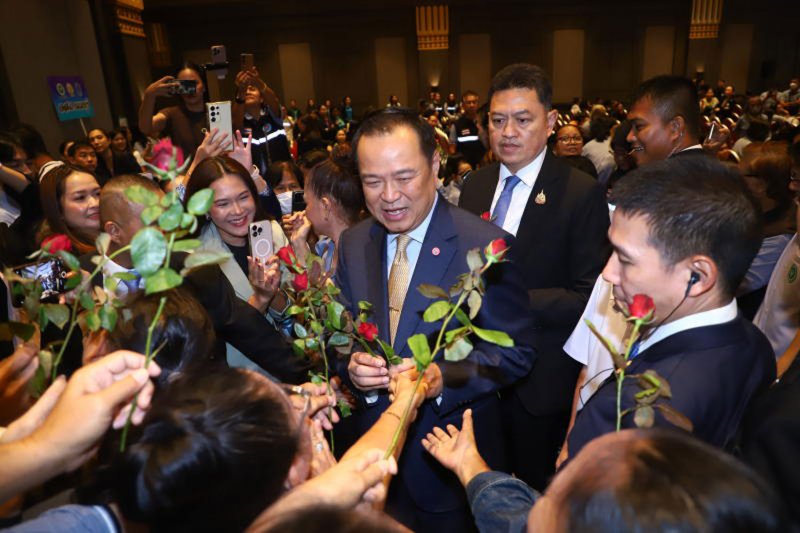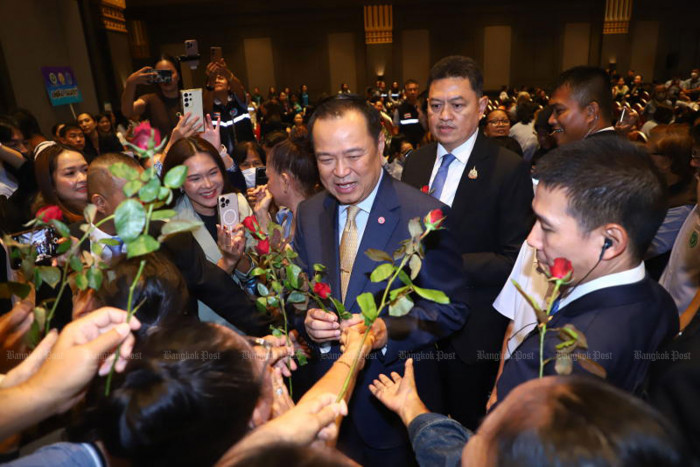
Prime Minister Anutin Charnvirakul receives flowers from supporters during an event hosted by the Public Health Ministry at IMPACT Arena, Exhibition and Convention Center, Muang Thong Thani on Sept 12. (Photo: Nutthawat Wichieanbut)
Economists warn that Prime Minister Anutin Charnvirakul’s “economic dream team” has only 4–6 months to show tangible results, urging the administration to focus on short-term stability.
Assoc Prof Somjai Phagaphasvivat, a political economist, said the team features a balanced mix of experienced professionals from both the public and private sectors.
However, he cautioned that success depends less on individuals and more on their ability to overcome major challenges within a narrow timeframe.
The administration must act to prevent the downturn from deepening, or ideally, stimulate a modest recovery, he said, adding this includes providing relief for affected businesses and households despite a tight fiscal environment.
With the nation’s fiscal deficit standing at 4.5% and public debt nearing 6.5% of GDP, the highest in over two decades, Assoc Prof Somjai stressed the importance of efficient allocation of public funds.
He also urged the government to avoid escalation, safeguard national sovereignty and enhance cross-border trade. With household debt exceeding 90% of GDP, urgent measures are needed, he said. Beyond short-term financial relief, he called for strategic support for SMEs to enable long-term recovery and growth.
Decline in competitiveness
The most difficult issue facing the Anutin government is Thailand’s declining economic competitiveness, Assoc Prof Somjai said. Over the past 14 years, the country has ranked ninth in Asean for economic growth, ahead of only Brunei, signalling a serious structural challenge.
The government must focus on two areas: technology development, including investment, innovation and digital infrastructure, and human capital development through broad upskilling and reskilling to maintain a competitive workforce.
Political realities also complicate the task. Assoc Prof Somjai warned that over the next 3–4 months, parties will prepare for a possible House dissolution and general election, potentially shifting focus from coherent policymaking.
Pressure to increase public spending could strain fiscal discipline, he said, stressing the need to balance effective governance, coalition harmony and fiscal discipline.
Understaffed team
Nonarit Bisonyabut, a senior research fellow at the Thailand Development Research Institute, said bringing in external experts has proven beneficial.
They bring experience in coordinating with government agencies and an understanding of private-sector dynamics, he added.
Despite these strengths, Mr Nonarit warned the limited timeframe remains a major constraint. He pointed to the dual responsibilities of Finance Minister Ekniti Nitithanprapas, suggesting this could lead to an excessive workload and inefficiencies.
However, in the short term, he added, the team appears understaffed, and additional capable individuals will be needed to reinforce capacity.
“We’d like to see more members added to the ‘dream team’,” Mr Nonarit said, naming respected economists, such as outgoing Bank of Thailand governor Sethaput Suthiwartnarueput, as ideal additions.
Focus on necessity
Mr Nonarit said the Anutin administration entered office with a primarily political mission, notably amending the constitution.
However, with the possibility of an early election, the government must also focus on economic issues, he said.
He said that not all citizens are politically engaged, and the public expects relief from economic hardships, particularly cost-of-living pressures and daily livelihood concerns.
“In this limited timeframe, the most visible outcomes will likely be short-term measures to ease economic pressure,” he said, adding that such steps could help the administration gain public support.
Despite potential short-term relief, Mr Nonarit expressed little expectation for lasting structural reform, highlighting the limits of time and continuity.
Policies that lead to sustainable economic change require extensive planning and long-term commitment, he said.
Without continuity, any momentum could be lost if a new government reverses or abandons key policies, he added.
Work on the foundation
While transformative results may be limited, Mr Nonarit said the government could at least lay foundational groundwork.
He proposed three priorities: improving public spending efficiency, initiating a “regulatory guillotine” to streamline redundant procedures and beginning the drafting of Thailand’s 14th National Economic and Social Development Plan for the country’s economic direction.
Commenting on recent Federation of Thai Industries proposals, he criticised them as short-term measures that do not address deeper structural problems.
Tax breaks, cost-of-living subsidies and soft loans may offer temporary relief but do little to strengthen long-term competitiveness, he said. Thailand continues to overlook structural issues such as workforce development, investment in machinery, productivity and operational efficiency, he added.
Instead, economic policy often focuses on quick wins, cost-reduction strategies or temporary demand-side boosts, such as the Khon La Khrueng co-payment scheme and Rao Tiew Duay Kan tourism subsidies, he noted.
“These may create short-term demand but are ultimately ineffective at driving long-term economic change,” he said.

